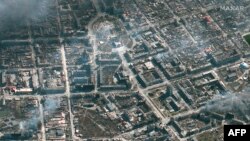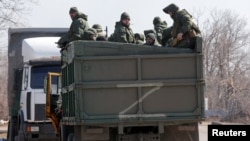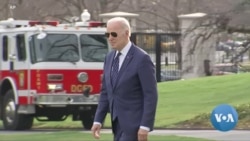Ukraine demanded Tuesday that Russia allow humanitarian aid into Mariupol and let civilians leave the strategic city that has been heavily bombarded by Russia since its invasion of Ukraine started nearly a month ago.
"We demand the opening of a humanitarian corridor for civilians," Deputy Prime Minister Iryna Vereshchuk said Tuesday on Ukrainian television.
Ukraine's appeal came one day after it rejected an ultimatum to surrender the southeastern Ukrainian city by dawn Monday as a condition for civilians to leave safely.
Ukrainian President Volodymyr Zelenskyy declared in a video address Tuesday to the Italian parliament, "There is nothing left" in Mariupol.
In a statement Tuesday, a Mercy Corps official in Ukraine said the country's humanitarian aid system has collapsed.
"The reality is that right now the humanitarian system is entirely broken down," said Steve Gordon, the organization's humanitarian response adviser.
Gordon said most cities and towns that are experiencing the most intense fighting "don't have more than 3-4 days' worth of essentials, like food."
Vereshchuk said Russian forces were also preventing humanitarian supplies from reaching civilians in the occupied southern city of Kherson but did not offer details.
Russia denies involvement in repeated failed attempts to open a corridor for civilians to safely leave Mariupol and targeting civilians.
Zelenskyy also said Tuesday he discussed the "difficult humanitarian situation" with Pope Francis and said the pope's role in mediating "ending human suffering would be appreciated."
On Monday, U.S. President Joe Biden warned of the potential for Russia to carry out cyberattacks against U.S. interests or deploy biological or chemical weapons in Ukraine as Russia's Ukrainian invasion nears the one-month point.
Biden told a group of U.S. business leaders Russian President Vladimir Putin did not anticipate the extent of unity he would face in opposition to Russia's actions and that "his back is against the wall."
"Now he's talking about new false flags he's setting up, including he's asserting that, we, in America, have biological as well as chemical weapons in Europe -- simply not true," Biden said. "They're also suggesting that Ukraine has biological and chemical weapons in Ukraine. That's a clear sign he is considering using both of those."
Biden also said Monday there was "evolving intelligence" that the Russian government was "exploring options for potential cyberattacks" against the U.S. in response to U.S. sanctions, and he urged the private sector to "immediately" harden "cyber defenses."
Russia rejected Biden's warning, with Kremlin spokesman Dmitry Peskov telling reporters Tuesday that Russia "does not engage in state-level banditry."
The leaders of the U.S., France, Germany, Italy and Britain held a call Monday in which they discussed concerns about Russia's brutal tactics in Ukraine, underscored their continued support to Ukraine by providing security and humanitarian assistance, and reviewed recent diplomatic efforts in support of Ukraine's effort to reach a cease-fire, according to the White House.
Later this week, Biden will attend a NATO summit, a G-7 meeting, and a European Council summit in Brussels, all focused on the situation in Ukraine, before traveling to Poland.
Negotiations
Peskov said Tuesday that Russia would like to see "active and substantive" talks with Ukraine.
Zelenskyy said Monday he is prepared to discuss a range of issues with Putin, including a commitment for Ukraine to not join NATO, as part of efforts to achieve a cease-fire.
Humanitarian crisis
The U.N. refugee agency said Tuesday the number of refugees who have fled Ukraine since the Russian invasion began surpassed 3.5 million people.
More than 2.1 million of the refugees have gone to Poland, 543,000 to Romania, 368,000 to Moldova and 318,000 to Hungary.
This week, the U.N. General Assembly is expected to resume an "emergency special session" to vote on a draft resolution prepared by France and Mexico demanding an immediate stop to Russia's hostilities against Ukraine, especially attacks on civilians and civilian infrastructure.
The text also demands the full protection of civilians — including humanitarians, medical personnel, journalists and foreign nationals — and people trying to flee the conflict.
War crimes
The Pentagon on Monday accused Russian forces of committing war crimes in Ukraine.
"We certainly see clear evidence that Russian forces are committing war crimes, and we are helping with the collecting of evidence of that," Pentagon press secretary John Kirby told reporters in response to a question by VOA.
Kirby also accused Russian forces of carrying out "indiscriminate attacks on civilians" that were "intentional" in many cases.
He said the U.S. would wait for ongoing investigative processes and contribute to those investigations into Russian war crimes.
In Moscow, Russia's Foreign Ministry said Monday it had summoned U.S. Ambassador John Sullivan, citing "unacceptable statements" by U.S. President Biden about Russian President Putin, an apparent reference to Biden calling the Russian leader a "war criminal" last week.
"Such statements from the American president, unworthy of a statesman of such high rank, put Russian-American relations on the verge of rupture," it said.
Pentagon correspondent Carla Babb and U.N. correspondent Margaret Besheer contributed to this report.
Some information came from The Associated Press, Agence France-Presse and Reuters.









